MS-ESS1-2
Develop and use a model to describe the role of gravity in the motions within galaxies and the solar system.
-
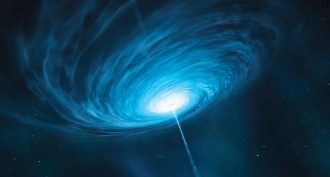 Space
SpaceHurricane at this galaxy’s center is wicked fast
The gale-force winds around one quasar whip by at almost 200 million kilometers per hour. That’s 625,000 times faster than the strongest hurricanes on Earth.
-
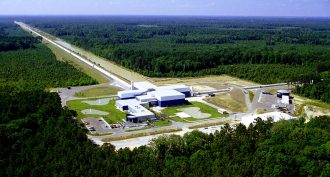 Physics
PhysicsGravity waves detected at last!
Albert Einstein predicted gravitational waves 100 years ago. Now scientists have detected them coming from the collision of two black holes.
By Andrew Grant -
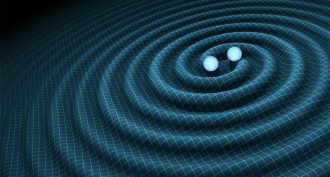 Physics
PhysicsExplainer: What are gravitational waves?
Albert Einstein had predicted that large catastrophes, like colliding black holes, should produce tiny ripples in the fabric of space. In 2016, scientists reported finally detecting them
By Christopher Crockett and Andrew Grant -
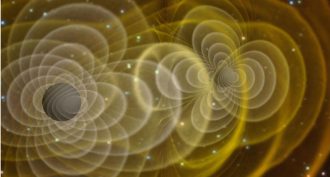 Physics
PhysicsHow to catch a gravity wave
Physicists have just announced finding gravity waves. The phenomenon was predicted a century ago by Einstein’s theory of general relativity. Here’s what it took to detect the waves.
-
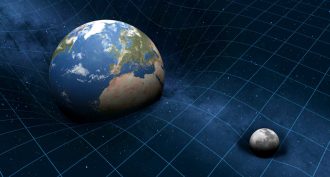 Physics
PhysicsEinstein taught us: It’s all ‘relative’
One hundred years ago, a German physicist shared some math he had been working on. In short order, his theory of relativity would revise forever how people viewed the universe.
-
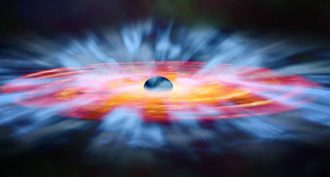 Physics
PhysicsStephen Hawking says his group has solved a black hole puzzle
Physicist Stephen Hawking says light sliding along the outside of a black hole holds the key to understanding what’s inside.
By Andrew Grant -
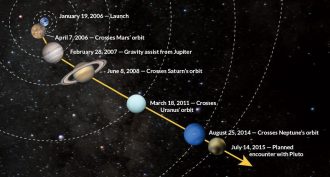 Planets
PlanetsVisiting Pluto
Pluto has long been little more than a dark spot in the sky. Now NASA’s New Horizons spacecraft is about to fly by this dwarf planet. Along the way, it will collect unprecedented data on it.
-
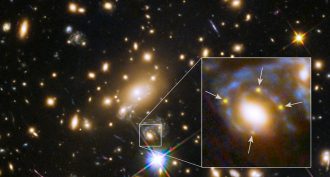 Space
SpaceGalaxy cluster creates ‘magnifying glass’ in space
A massive galaxy’s gravity is so strong that it bends light, creating a “lens” in space. This natural magnifying glass is giving astronomers a rare view of a supernova on the other side of the universe.
By Ilima Loomis -
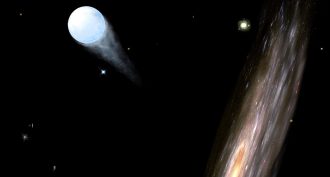 Space
SpaceAstronomers spy fastest speeding star
A few stars have been spotted departing our galaxy. The fastest of these might have been propelled by another exploding star, a new study finds.
-
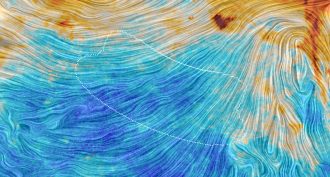 Space
SpaceDust erases evidence of primordial gravity waves
In March 2014, scientists claimed to have found the first echoes of the Big Bang — ripples in the very fabric of space. A new analysis shows the experts were mistaken. Dust appears to explain the confusion.
By Andrew Grant -
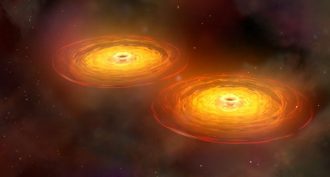 Space
SpaceBlack holes are on collision course
But be patient. The distant galactic smashup is still some million years away.
-
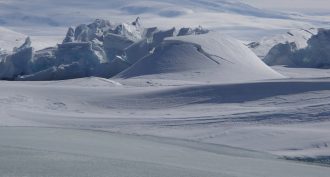 Earth
EarthExplainer: Understanding ice ages
Earth slowly wobbles, tilts and stretches (or contracts) as it orbits the sun. These changes may be fairly small and subtle. Still, their cumulative impacts can be huge — sometimes triggering the slow onset of an ice age or an abrupt thaw.
By Sid Perkins